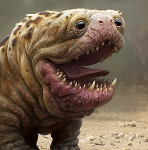Cause;128566 said:
Not sure what's meant here. When organisms appeared and went extinct does not provide proof of descent. Only that they once existed and now do not.
Cause;128319 said:
In this sequence 4 is missing. Does it suggest the rest of the numbers are not advancing in sequence? Are we unable to determine what number holds its place? Does it stop us knowing 11 comes next?
In the fossil record, the progression is more like:
1 - series of ? - 358 - series of ?? 29695
The assumption is that numbers 2 through 357 just cannot be found, but must be there.
[QUOTE=Chewy;128442]I contend that it is a presumption of evidence that similarity in organisims indicates that they are descendant.QUOTE]
Have to quote self since objection was not addressed. 4 limbs in 2 different organisms does not of itself indicate descent or common ancestry unless you have the presumption so. A single finely graduated chain is not documented. My contention is the lack of intermediary links in the fossil record. All kinds of organisms appear very suddenly on the geologic record and do not change. Some disappear just as suddenly as they arrived. In the very beggining, it was expressed that Darwinian theory espouses microevolution. Since microevolution finds little, if no, support in the geologic record, macroevolution is proposed. By sweeping away microevolution, evolution must now take bigger and bigger leaps. ie. All of a sudden a 2 cylinder engine appeared out of nowhere WITH all the necessary infrastructure for it to operate.
You raised an interesting subject. The ostrich. Hollow wings in a flightless bird. The hollow wings are intrinsically connected to the respiratory system. Air passes through the hollow wings as part of the respiratory system. If an ostrich were to have solid bones, more would have to change than just the solid bones. Thus the analogy of the 1 cylinder to 2 cylinder engine. (Which could have been given more explanation, I suppose.) More than the obvious structural change would have to have taken place simultaneously since other biological functions are intrinsically linked. Incidentally, the ostrich is one of the fastest land animals since it can flap its wings and run taking strides up to 4.5m and reach speeds of 65km/hr. Hate to weigh the poor ostrich down by giving him solid bones.

 Help
Help
 This topic is locked
This topic is locked














